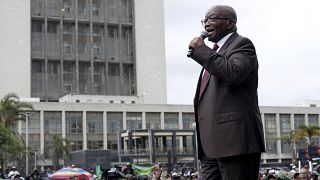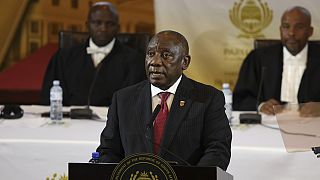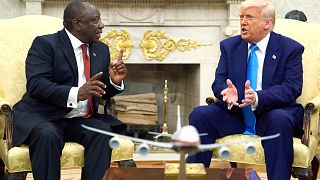South Africa
Some 27 million South Africans are already registered to cast a ballot on May 29 in the country's pivotal national elections. In the past months, polls, some contested, have consistently predicted the ruling African National Congress could lose its majority in Parliament for the first time.
Since the ruling African National Congress (ANC) came to power with the fall of apartheid 30 years ago, it has always won a single national election.
Several polls however project that the party once led by Nelson Mandela will slip below 50% of the vote.
The Johannesburg-based Brenthurst Foundation [Editor's note: The foundation was established by the Oppenheimer family] unveiled on a election on March 8.
The survey conducted by conducted by SABI Strategy earlier this year and shows that the southern African nation will almost certainly have a coalition government after this election as the ANC has slid further to 39% of the vote.
1506 registered voters participated in the survey.
The results have been modelled on the basis of the 66% turnout of the last general election in 2019.
Over half (53%) said “The ANC government of the last three decades” was to blame for the issues the country faces, followed by 11% who said apartheid was to blame.
The continent's most developed economy grapples with issues including record unemployment, an electricity crisis that's led to crippling blackouts for homes and businesses, and widespread voter mistrust following a stream of corruption allegations over the years.
The respondents list unemployment (28%), corruption (27%), load shedding (17%) and weak leadership (12%) and crime (11%) as pressing issues.
Opposition parties win big
John Steenhuisen’s and the newly founded MK Party which has been endorsed by Jacob Zuma are the apparent winners of the ANC's waning support.
The MK Party which was launched last December and has been endorsed is set to overtake the EFF with 13% of the vote.
The Democratic Alliance (DA) which is led by John Steenhuisen has grown its share of the vote to 27% (from 23% in October last year).
The Economic Freedom Fighters of Julius Malema which have been popular among many disenchanted South Africans are losing ground according to the survey unveiled on March 8. Support for the EFF stands at 10%, down from 17% in October.
An equal number of voters (33%) believe the DA and the ANC are the parties most effective at governing.
The survey's credibility has however been questioned by the EFF.
The EFF's spokesperson tweeted rejected the survey's findings: "the Oppenheimer’s have been giving millions to the DA, Action SA and Rise Mzansi, and by no surprise, their poll projects the growth of the parties they fund."
South Africa has never had a coalition at national level because of the ANC's dominance.
The biggest wakeup call came in local elections in 2021, when the ANC slipped below 50%.
If it loses its majority, the party would need to enter into a coalition to remain in government and keep Ramaphosa as president for a second and final five-year term.
South Africans vote for a party and not a presidential candidate in a general election. Parties are then allocated places in the 400-seat Parliament according to their share of the vote, and lawmakers elect the president.
In the election, South Africans also will vote for the makeup of provincial legislatures in the country's nine provinces.
As of March 11, about 27,7 million voters (27,736,074) registered at the Independent Electoral Commission (IEC) of South Africa.












Go to video
Semenya ruling shakes foundations of gender rules in sport
01:53
SMES under pressure as business confidence hits four-year low in South Africa
Go to video
Former South African deputy president David Mabuza dies at 64
Go to video
’Black Empowerment’ law stalls Elon Musk's $113 million investment in SA
01:30
Uncertainty looms over Nissan South Africa as global restructuring continues
02:19
South African actor Embeth Davidtz makes directorial debut with Rhodesia-set drama